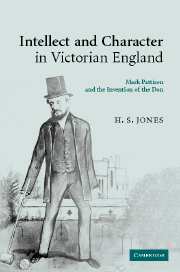Epilogue. The don as intellectual?
Published online by Cambridge University Press: 02 March 2010
Summary
Pattison's importance rests in the fact that, at a time of upheaval in British and European universities and the reinvention of the academic profession, he stood for a distinctive conception of the nature of the academic life. If that conception has to be summed up in a phrase, we could say that Pattison held that the don had an obligation to be an intellectual. But the term ‘intellectual’, which was just coming into usage in Pattison's time, is an ambiguous one which needs some unpacking.
Stefan Collini has recently distinguished three very different senses of the term. It is sometimes used in a sociological sense, to designate the educated class as a whole: ‘all those who create, distribute, and apply culture’, in Seymour Martin Lipset's words. Academics plainly fall within this socio-professional category, and did so before the nineteenth-century transformation of the university as well as afterwards. In this sense, to say that the academic should be an intellectual is like saying that a miner should be a manual worker. More relevant for our purposes are Collini's other two senses. The term is sometimes used in a ‘subjective’ sense: here it denotes ‘a particular commitment to truth-seeking, rumination, analysis, argument, often pursued as ends in themselves’. More commonly, the term has a cultural sense, in which it highlights the authority which intellectuals enjoy, or aspire to. This is the sense that Collini foregrounds.
- Type
- Chapter
- Information
- Intellect and Character in Victorian EnglandMark Pattison and the Invention of the Don, pp. 256 - 260Publisher: Cambridge University PressPrint publication year: 2007



